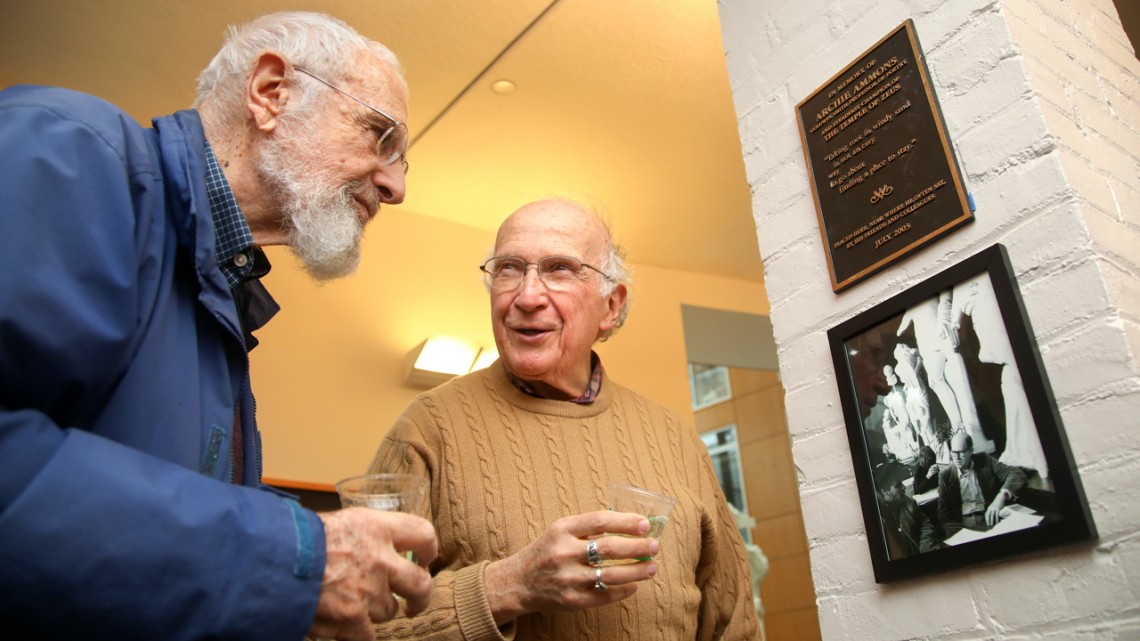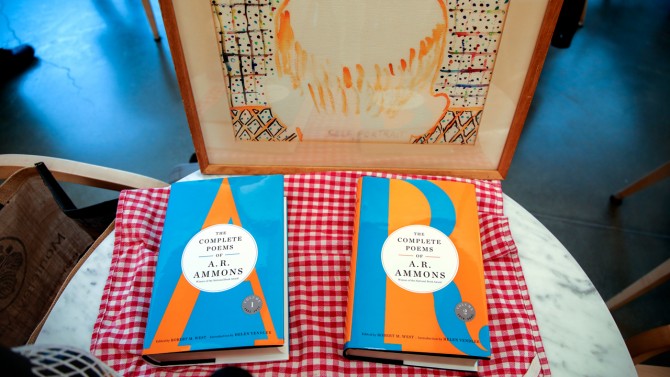
Professors emeriti Neil Hertz and Roald Hoffmann remember Archie Ammons at reception celebrating Ammons’ legacy. A plaque was reinstalled in the Temple of Zeus café along with a photograph showing the poet with a student at the original café in Goldwin Smith Hall.
Colleagues celebrate A.R. Ammons in Temple of Zeus
By Daniel Aloi
Renowned poet and legendary Cornell faculty member A.R. Ammons – “Archie” to all who knew him – was remembered by colleagues and friends at an informal reception April 9 in Klarman Hall.
The occasion was twofold – to celebrate the recent publication by W.W. Norton of a new two-volume edition collecting Ammons’ complete poems, and the reinstallation of a plaque in his memory, in the current location of what was the late Goldwin Smith Professor of Poetry emeritus’ favorite spot on campus – the Temple of Zeus café.
“Part of the reason we are here is celebrating the Temple of Zeus, to honor the whole companionship of poetry and where Archie spent so many hours – the original Zeus, the second Zeus and, virtually, this Zeus,” said Roger Gilbert, the Picket Family Chair of English.
Cornell’s unofficial poet laureate would often bring new acquaintances to Zeus, where he was at home among the bustle of students and the plaster classical statuary.
The brass plaque, originally dedicated in 2003, identifies Ammons as a “steadfast champion of the Temple of Zeus” and features a snippet of his verse:
Taking root in windy sand
is not an easy
way
to go about
finding a place to stay.
It hangs above a photo of the poet in the café’s first home, which is now Kaufmann Auditorium. The next iteration of Zeus was opposite the auditorium, across the Goldwin Smith lobby. The café came to its current location in the Klarman Hall atrium in 2015. The atrium is, fittingly for poets and writers, the nexus of Cornell’s building for the humanities, statuary and all.
Archie Randolph Ammons taught at Cornell from 1964 to 1998 – it was his first university position after various jobs and minimal success as a writer. He flourished here and won most of his craft’s major honors, including two National Book Awards, a National Book Critics Circle Award and, in 1981, one of the first MacArthur Fellowships.
Writers he mentored as students included Alice Fulton, MFA ’82, the Ann S. Bowers Professor of English; and Kenneth McClane ’73, M.A. ’74, MFA ’76, the W.E.B. DuBois Professor of Literature emeritus. Ammons died in 2001 at age 75.
Gilbert brought copies of texts to the reception, including “The Complete Poems,” as well as digital audio recordings and one of the poet’s watercolor paintings, a framed self-portrait.
Following a toast to Archie, a recording of him reading “The City Limits” kicked off readings from the Ammons canon by English faculty including Joanie Mackowski, Paul Sawyer and Harry Shaw; professors emeriti Neil Hertz, Roald Hoffmann and James McConkey; and librarian Fred Muratori.
“I remember meeting him – this man with a fedora, courteous, a shy guy on the line in the cafeteria, introduced by a wildman poet named David Ray – he looked like David Ray’s parole officer,” said Hertz, who read “Terrain” from the 1964 collection “Expressions of Sea Level.”
(Ray, a young Cornell instructor, invited Ammons to give a campus reading in 1962 – a standing-room event thanks to buzz among faculty, as Epoch magazine had accepted some of Ammons’ poems after two rejections.)
“I can show you the rejection slips,” Gilbert said. “We’ve got them in the archives.”
McConkey, who after that 1962 reading encouraged the writer to apply to teach at Cornell, contributed “Coward,” one of Ammons’ shortest works, at the gathering: “Bravery runs in my family.”
While noting “I enjoy Archie’s humor as much as anybody,” Peter Fortunato chose “a serious poem” to read, dedicated to a famous former student of Ammons’ who became an internationally known literary critic – “For Harold Bloom.”
“When Harold Bloom wrote about Archie and kind of discovered him for the world, it made a world of difference to Archie and it began a lifelong friendship,” Fortunato said.
Ammons’ playful nature in person and on the page was a recurring theme, and Gilbert recalled the day in 1993 when “Garbage” won the National Book Award, and the English department decorated Ammons’ office door with trash.
The chair said he has plans for that door, now removed and set aside, as part of a display envisioned for a proposed “poetry corridor” in Goldwin Smith, in honor of Ammons and others who have passed through the department.
The Poetry Foundation has provided funding for the exhibition, along with a recent grant to digitize some Ammons manuscripts in the Cornell Library Division of Rare and Manuscript Collections – “including the original roll of adding machine tape on which he typed ‘Tape for the Turn of the Year’,” Gilbert said. The grants were initiated by foundation president Henry Bienen ’60, after a meeting last year with President Martha E. Pollack.
Media Contact
Get Cornell news delivered right to your inbox.
Subscribe

